Interview with Knight's Cross winner Ernst Germer, veteran of the Fallschirmjäger Regiment 1. Amazingly, Germer fought in Poland, Norway, Holland, Crete, Russia, and Italy. Braunschweig, 1986.
[Above: Ernst Germer.]

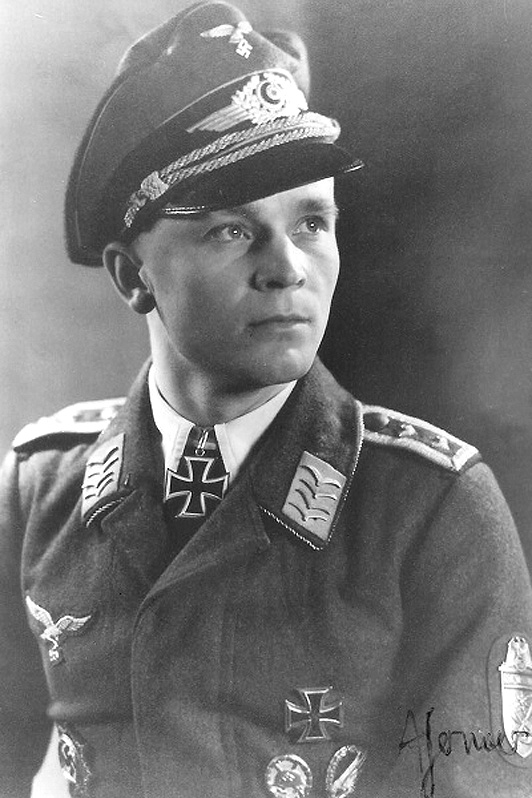
Interview with Knight's Cross winner Ernst Germer, veteran of the Fallschirmjäger Regiment 1. Amazingly, Germer fought in Poland, Norway, Holland, Crete, Russia, and Italy. Braunschweig, 1986.
[Above: Ernst Germer.]


Ernst: Yes, my young friend, it is not often anymore I receive company and thank you for the gift, you are a good one to talk to. I am an old man now and my years have faded, so I am happy that we are not forgotten. My health fades but I have my memories, speaking of which you must visit Willi [Koch, paratrooper and Knight's Cross winner] soon, you understand. Boy that was so long ago I came to all this nonsense of war. It all started with Hitler where he built up the Luftwaffe in 1935, all young men had to have service time.
I decided that the Luftwaffe would be for me, and I was intrigued by the new paratroop arm that was looking for eager men. I took a chance and volunteered for this. After the usual testing I was selected to attend jump school. Of course, the basic military training had to be finished first, but after that, here came paratroop school.
What was the jump school like and how hard was it?
Ernst: It was a hard life in the paratroopers, you had to be exceptionally fit and limber. The running and exercise were daily, many times a day. It was up early, exercise, clean barracks, eat, do drills or classroom, jump instruction, eat, exercise, more jump instruction, exercise, eat, free time, and bed.
That was our day as I remember, we kept this up for a few weeks, then the real fun came where we had to put all this instruction to practice and jump six times to earn our qualification as a parachutist. Then we received the badge in a big ceremony. After this it was off to learn field tactics and combat control.
Here we had more free time to go out and enjoy the life of a soldier, we filled ourselves with drink and dance to impress the girls. This was all right before the war; we had no idea things were going to get so bad. We lived a happy and carefree life in a Germany that was proud and strong again.
You fought in Poland; why was there war and can I ask what it was like for you? How did you view the Poles? I want to write down how you felt about it all.
Ernst: Ah Poland, that was my first action, we never cared for the Poles due to their attitude on Germany. What this shameless press says today is rubbish. Our young today are taught we were wrong; they are lied to. Poland was awarded German land, with German citizens who did not want to live under Polish rule.
Hitler had tried to work out a peaceful existence with the newly created state and was almost successful early on. It was the intervention of the English and Americans who caused Poland to see rightful German requests as war provocations. Germany only sought to return the lands that were overwhelmingly full of former Germans.
Due to these issues, an escalation happened where Hitler became more adamant that a solution must happen. On the other side Poles started to agitate against the German minority and attack them. Many were driven from lands they held for hundreds of years, you see. I remember seeing the reports early on showing Germans who had been beaten and some even murdered by Poles.
Due to these incidences, and incursions onto Reich territory, Hitler had drawn up plans to attack Poland if a solution could not be found. Now, many will accuse him of only wanting to attack, with false claims of peace, but they are wrong. Hitler, I personally believe, was very patient and tried the peaceful route.
The Poles were agitated and being provoked by Hitler's demands and bolstered by England. This put Hitler in a situation where he could just back down and do nothing, but it would not settle the issues that needed settled. I understand why he ordered the attack; it is not popular to say today, but I agreed with his decision.
To leave Poland in control of ill-gotten lands would not have been the right thing to do and adding the attacks on Germans, made war inevitable. I remember we were ordered into ready positions, and we all joked about what was coming. Little did we know how much it would escalate.
The English declared war on Germany for this attack of course, under the guise of protecting Poland's sovereignty yet when Stalin attacked, they did nothing. Our press showed them for who they were, anti-German only. We went into action against well-trained Polish forces who were very well-equipped.
I still remember being greeted as liberators by the people, they had to take measures to defend themselves against Polish mobs. I saw houses barricaded and fortified. The people told us of very bad treatment by the Poles in the past few months. There were reports of Germans who were pulled out of their homes and killed by mobs of angry civilians. This was sadly a theme we would see all over Europe.
As to what I thought of the Poles, I would say I remember being angry that we had to be at war due to a stubborn people. They had been given German land, yet they acted as if it was a cut-and-dried situation. When we demanded it back, they acted like a school yard bully who had the headmaster's blessing to taunt Germany.
Well, our new form of warfare was not anything they counted on, and we routed much larger army units. I will say to you these units were well-trained, well-led, a few even had former German officers. Today, they and their red masters say they were unprepared and small, not true. Poland had a very large and organized military ready for war.
Our Luftwaffe was able to defeat all their air units which freed the skies for us. We broke open Polish lines, and the new paratroop units had our first action, in which we defeated far superior enemy units. I want you to know this, we treated the Poles as brothers when the fighting was done.
We knew this was not a fight between our people, it was the leaders who made us go to war. We would sit with captured soldiers talking about our weapons, home, and girls. We allowed them full honors and although they were rounded up and sent to camps at first, many were allowed to come home soon after.
Poland was our baptism, and we proved this new arm was fully capable to strike the enemy hard and win. We came home in October to a thunderous welcome, and to more training. We knew that with the English and French in the war now, there was more fighting to come.
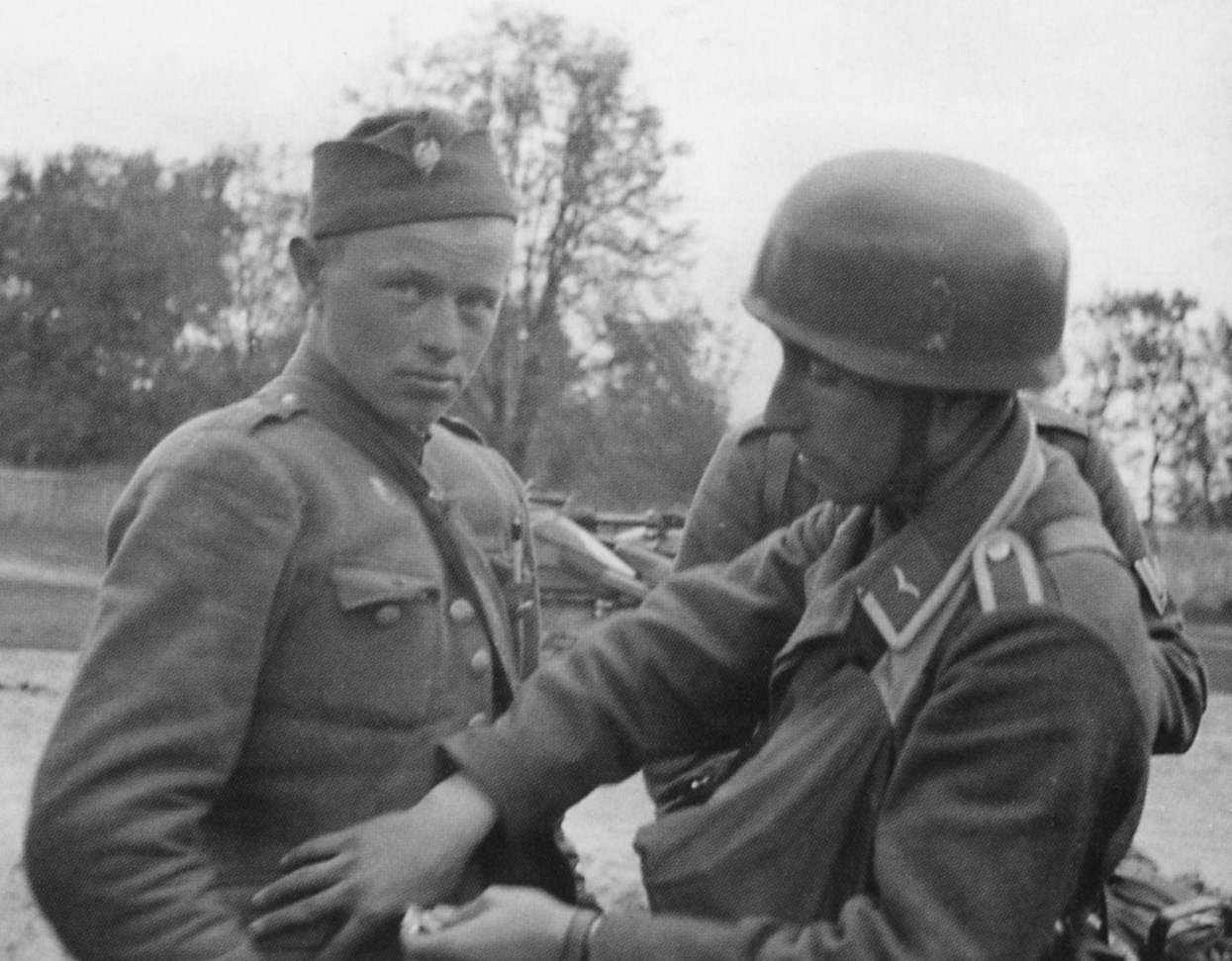
[Above: An Oberjäger of II./FJR 1 searching a Polish soldier after his surrender.]
I understand you jumped in Norway, what was this like, and again how did you view the Norwegians?
Ernst: Indeed, Norway was next. Now here the situation was different. We had no problem with Norway; however, they were not entirely friendly to us. The English decided to invade their nation, which I am sure would not have been a very bloody invasion as they sided with them. They wanted to cut off Swedish supplies to Germany. We jumped onto and seized airfields so that more men and supplies could be brought in.
We held these targets without much resistance, and let me remind you, we were again told we are at war with the government, not the people. When we went in many Norwegians had no desire to fight us. Many simply surrendered and asked for good terms. This was given to them; many were sent home after turning in their weapons.
To give you an example I will never forget, a comrade from my company injured his ankle and we had to leave him with a friendly family who agreed to care for him until we returned. We had no choice and figured he would be captured at the least. When we did come back for him, he was wrapped up by the fire, eating a hearty soup, and doing a puzzle with the family. Not a bad war to be in.
My time here was interrupted by orders to return to Germany with my battalion, we later learned it was for the attack in the west. We were selected to jump into Holland, which was a key to success. We had to seize bridges and an airfield to prevent destruction. This operation was perilous as we were cut off from any land units.
The Dutch put up very stiff resistance and here we suffered our first large losses. The men performed well here and adapted to the situations. We held off attack after attack and held all our objectives, which the Dutch made it hard to do. We paratroopers held the bridges and airfield until the army arrived. Which I will tell you was a happy day for us.
After all this action in Holland, we were recalled back to Norway as the fighting stalled out into stalemates, and even some units were facing defeat. We had to relieve comrades and then move up north to clear out the British and French.
Enemy troops landed at the same time German forces did, and several battles developed. Narvik needed help and we were sent to reinforce the front which was in trouble. The enemy was dug in with naval support and we only had occasional air drops. I will say we received help from those who saw us as better than the English and after the fighting was done, many Norwegians came over to help us.
My company stayed until the British and French retreated when France was defeated. We were on the verge of taking their positions in any case. More units were moving up from the south, and pushing back the enemy, taking many prisoners. We had a few in our ranks, and we had fun with them playing cards and sharing stories of home. The war did not have any hate at this stage.
I know the biggest action for the paratroopers was in Crete, and I am curious about this jump and the fighting. Also, if I can ask, what about the civilians who are said to have fought alongside the British?
Ernst: Ah Crete, that was our biggest victory, and I remember it well. The British came to the aid of Greece after Mussolini invaded them, for no good reason. Hitler was forced to commit us to the action when we should have been sent into Russia in April or May. We went through very friendly areas to get into position for Crete.
The Greeks and British retreated to the island, and it had to be taken. Many of us did not know the island was our target until a few days before. We were told the enemy had time to prepare and dig in so that this would not be an easy task. We looked at photos showing positions and tried to memorize them.
I remember no one was allowed off base, as we were being hidden from prying eyes. They did not want anyone to see German paratroopers on base. All helmets and jump equipment were hidden away when we arrived. It looked like Greece was a very nice place, with friendly people, but I never was able to see much.
My regiment was assigned a place called Heraklion [the largest city and the capital of the island of Crete] and its airfield; each battalion had its objective. If you were unlucky, you landed right into the teeth of the beast. When we jumped there had already been a lot of action by aircraft, they hit the defenses non-stop. The problem was their aim was not so good.
As we came to see when we were over the island, they fired with all they had, some Tante Ju's [the Junkers Ju 52 was nicknamed Tante Ju (Aunt Ju)] went down or were badly damaged. The ground was not ideal for this type of assault, and I remember our canisters became lost. Can you image trying to find your weapons while under fire? The overall assault became a disorganized battle that made us go into defense.
I believe we stayed on the defense for a few days until the western forces were able to overcome resistance and move east. They came to link up with us and we then pushed into the town and took all our objectives there. At this time, we linked up with lost units and took stock of the losses.
By the end of May the island was ours and we achieved a great feat. We jumped into the belly of the beast, vastly outnumbered, yet in the end we overcame. Our losses were very big, however, many of my best comrades fell. There is a memorial that is now falling into disrepair as the Cretans did not view us as liberators.
[Above: This Feldpost has a special postage stamp, it uses the regular Feldpost airmail stamp, but with an 'INSELPOST' (island mail) overprint. This particular postage stamp was overprinted in Crete on November 1944. There are seven types of Inselpost overprinted stamps which were used on Crete and the Aegean Islands. These emergency overprints were done after the Allied occupation of Greece, which prevented the soldiers on the islands from using normal sea transport. From the autumn of 1944 these special stamps were used on the islands of Crete, Rhodes, Milos and Leros. Click to see and learn more.]
[Above: All of the varieties of Inselpost stamps. Together these are many thousands of dollars.]
[Above: Soldiers even had their own newspapers, like this one from the island of Rhodes. It says:
'Wacht auf Rhodos
Deutsche Soldatenzeitung für die Insel Rhodos'
(Watch on Rhodes
German soldiers' newspaper for the island of Rhodes)
This issue is from January 15, 1944. Click to see more.]
Can I ask you a sensitive subject? I know it is claimed by the Allies that German forces massacred many Cretan civilians right after. Can I ask you what that was all about and if you saw it?
Ernst: My goodness we do not speak about things like this, you will find no one who will speak to you regarding this if you ask outright, so be careful. It is not because we are guilty or wrong, we are afraid we will then be accused and pulled before a tribunal. It is never justified to defend actions against civilians. I want to make you are aware of this in case you did not know.
Considering who I am speaking with, you should know we do not want to be asked questions about the unpleasantness of war, but also, I know you are a good one and I believe you really want to know the truth; therefore, I will speak to you about this. But I beg you to keep this for later.
I have come to know that when the Greeks and British retreated to Crete, the British set out to fortify the island, and part of this was to pay civilians to help them. They armed these civilians and even gave them training in partisan warfare, of course they denied this. The civilians admitted to this many times while being interrogated.
They stated that the British military encouraged them to fight, saying they would be seen as heroes and given land after the victory. British prisoners told us they never had such an agreement, and the civilians just rose up and fought to defend their homes. It was proven that the British did encourage them by making arms available to some.
When we jumped on the island, these civilians had been roused by British promises and communists who fled the mainland. Of course I am speculating about this, but it would explain some things that happened. These civilians did not just up and decide to fight soldiers, they were encouraged and led to do this. Some of the more heinous killings I believe were from communists who were getting even, so to speak.
As soon as the landings happened civilians joined in on the firing on planes and soldiers. This was illegal but can be forgiven as we were the invaders. What cannot be forgiven was that many of these civilians went out of their way to murder wounded soldiers by throwing grenades at them and stabbing them while defenseless.
We saw a group who were taken prisoner and held in a toilet room when civilians threw grenades at them after an attack began. They would sneak up to areas where Germans were seeking shelter and attack wearing no uniform. Many men died because they could not bring themselves to fire on civilians.
There was evidence where men who were trapped in trees without weapons were killed by pitch forks. A field hospital was fired on, killing many wounded and civilians were seen doing this. There were so many reports that came in about civilians attacking our men that it could not be ignored.
I must also add that there were many Cretans who were friendly, and some even came to help Germans. In one sector during a quiet time a man did come to bring goat cheese and water. You see German rations were far too salty for this climate, and our water situation was bad so you could not eat them.
The men said they were threatening him at first, thinking it could be poisoned, but he ate some and drank to show them he was only trying to help. These are the people who after it was over pointed out those who had bragged about attacking Germans. Some had newly arrived in the island, and I believe they were sympathetic to communists.
The general ordered teams to go out to look for our fallen, and these teams reported back that many soldiers had been killed with rudimentary weapons after being wounded. This coincided with reports of the men witnessing attacks by civilians using all types of weapons. Pitch forks, saws, knives, and in many cases, weapons given by the British.
This was viewed as a grave war crime and uncalled for. The guilty who did these things needed to be brought to account, as any nation would. The problem is we lost the war so our enemies can make our punishments look like an unjustified war crime. I want to say there was even a Jewish quarter where they were friendly to us. It was unfortunate that they were removed from Crete later on for fear of spying, and the British killed them all.
Our accusers leave out key details about these actions. It is unfortunate, you see, that these civilians were coaxed into fighting or did so on their own. They killed soldiers in uniform while not wearing a uniform. This is not allowed in war and in every conflict where this was done, the guilty were either hung or shot. They also allowed prisoners to be released if they agreed to fight, they deny this, but many people came to us asking for them to be locked back up after committing more crimes.
I know these things were done on Crete shortly after the battle was over. Quick summary courts were formed, and eyewitnesses pointed out guilty people, and anyone who willingly aided them was held to account. They were taken out and shot, despite their cries of having done nothing. It was not the first time guilty people said they did nothing.
The winners of the war have turned all this into a study of the evils of the paratroopers on Crete. They want the ignorant masses to have a view that we were misled by what we saw, that it was the heat that caused odd wounds, or it was British soldiers wrapped in civilian shawls being claimed as a civilian and so forth.
Basically, they try to defame us as liars and evil doers, where we executed innocent people who had no hand in the fighting. That in essence we followed the path of the killing squads made so popular in postwar propaganda. That we lived up to our reputation of baby killers and criminals. They never tell you what caused these actions to be done, never. All they want to do is make them out to be innocent victims who did nothing.
German forces later in the war, had to contend with civilians being recruited by our enemies, either on political grounds, or personal. They rose up and fought us against all rules of war, and then cried when we retaliated against them. That is our lot I am afraid; it is the wages of losing.
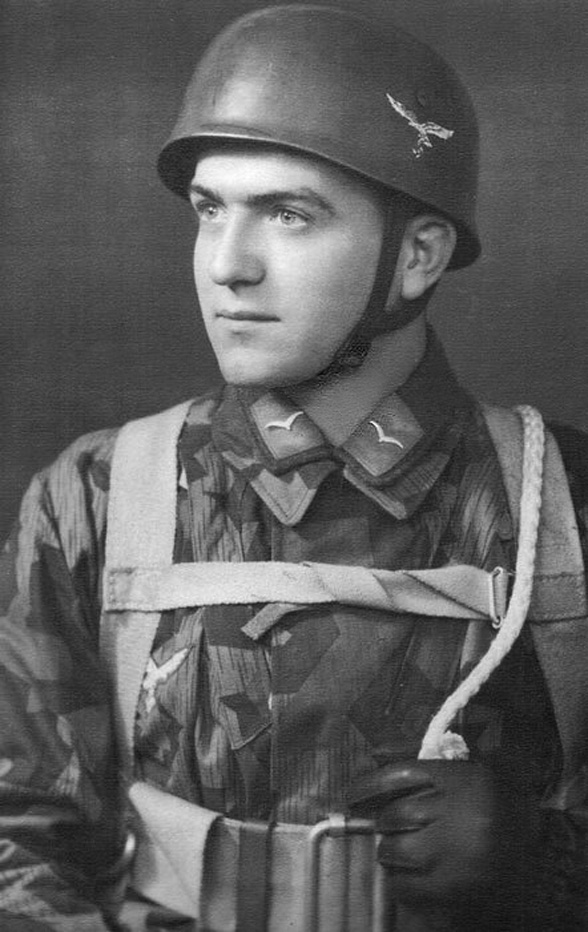
[Above: German paratroopers shocked the world with some of their astounding feats during the war. Things thought impossible, like the rescue of Mussolini and the taking of Fort Ében-Émael.]
You won the Knight's Cross in Italy; can I ask what you did to earn this award?
Ernst: Yes, I am counted as one of the few to wear this award, but it was awarded for only doing my duty. My unit was posted to Italy to halt the Allied advance to buy time for the other fronts. I was leader of the bike platoon, and we saw an opening to bring down an attack on the British. We rode into a place called Pesaro, which was on the coast. This was in late August of '44 so the Allies had made gains in Italy but were becoming complacent as they had such power behind them.
The control of the seas and skies made them relaxed, and we had great success with small assault units that were mobile. I took my men into the harbor with Panzerfausts, quickly outsmarting the Tommies. We had great success in knocking out those steel cans and held off the counterattacks.
Oh boy we made them mad; they had amassed these units for an attack on us, but we hit them first and embarrassed them. I can still see their officers screaming at the men to do something, while they tried to understand what was happening. If it had not been a war, it would have been a comedy.
We held them off, taking supplies we needed, and destroyed a lot of theirs. We did all this and then were called back; we fell back with big smiles. We did a very small operation that produced decisive results. We returned to our lines with full pockets and great cheers, with smoke still rising from the port.
How did you view the Italians? What do you remember of them?
Ernst: I have nothing bad to say about them, they were very friendly to us and went out of their way to help us when they could. Of course, they were tired of the war and wanted it over, but they seemed to favor us. I am reading reports the Allies raped and assaulted many of their women, that explains why so many moved north as we did.
I am speculating but we did have odd things like this happen. For the most part the Italians were a great ally for us up until 1943 when they surrendered. Then it was a civil war where the north was opposed to the south. We had many who came to help us, and we had very good relations with them. There were small groups of organized partisans, however, and they ended up getting Mussolini.
I know there were cases in Italy where partisans attacked but I never really saw this until the end of the war. For me the Italians were very friendly people, who if they did not like us, at least they acted friendly to us in our presence. We would be provided with food, shelter, and intelligence many times by friendly civilians. I want to say something here to you that shows the hypocrisy of war.
Our battalion had a young boy of maybe seventeen who would report for us on the positions, and changes of the British forces. We advised him he could be killed if found out, and he was dissuaded from doing this, however it was valuable intelligence at this stage. He stopped showing up and after our commander asked for inquiry, it was learned the British foreign troops, the Gurkhas, caught him with a map and killed him.
So, for them it is permissible to do this, but when German forces did this, it is a crime. This is something that I believe happens a lot in war, but the winner can claim to be innocent. I have seen on TV the footage showing Italians greeting the Allies there, but remember they greeted us as well.
We were allies and they treated us very well, providing food and drink when they could. There were bad ones who had to be handled, but this seemed rare. I have more fond memories of Italy than bad. The weather was great, and the wine was a pleasant surprise when we had lulls in the fighting.
Often when we had positions by small towns, the people would bring us wine, cheese, and meats. They did not like the Allies that had been bombing their country and they had loyalty to Mussolini still. Some men would get caught during lulls sneaking off to visit the young women when they could.
[Above: Ernst Germer]
Do you know anything about the shooting of prisoners of war in Italy? Was it a common practice, did you see any of it?
Ernst: You want to ask things that are not safe I see. As far as I am concerned, we did not act against the rules of warfare. We did not need orders to tell us to take prisoners, we knew it was the right thing to do. To shoot anyone would leave a bad taste and invite revenge.
Therefore, this is not something German forces did. Now with that said, did it happen? Yes indeed. I am sure there were times in the heat of fighting that emotions ruled the moment, and an angry comrade might have done this. I never saw it personally, however, there has been comrades who said they saw it.
It was against our oath and honor, so I am sure it was rare. I must mention our enemies as well. I also do not believe they had a mass issue doing this, but at times I wonder. They mostly seem to have a fair sense that we were all soldiers and answering our nation's call. I cannot say the same for the colonial soldiers.
I also know the Poles in Italy could be quite cruel, we heard comrades and Italians tell us that men who surrendered were beaten and shot. Some German units did report seeing this after retaking an objective. There were cases in Sicily I am hearing about now, and in France where prisoners were shot en masse.
I am afraid your countrymen [USA] had a bad reputation for doing this as well. I think your cowboy mentality and gangster culture might have had an influence on this. I can tell you I surrendered to the British and we were mostly all treated very correctly. Some soldiers acted harshly and pushed, and hit, or stole items, but most were correct.
Can I quickly ask about Russia, I believe you fought on the Russian front. How did you view the Russians?
Ernst: Yes, I was sent to Russia to bolster the front, and the fighting was very hard, I do not have fond memories of Russia. The people yes, the climate and soldiers no. We fought against very uneven odds, so it made the going very rough for us. The Russian people were very friendly with us, however.
I was very surprised to see how modern Russia's cities were, life went on in the west of Russia like there was no war. Shops were open, people were happy, and I saw no disdain for our forces. We seemed to get along well with them as they viewed us as liberating their nation from the Bolsheviks.
I will tell you I have no respect for the Russian soldier, he may have been answering Stalin's call, but in the end, he was a butcher. What they did to Germany and Eastern Europe is unforgivable. From mass deportations, rapes, and murder they were the epitome of evil, yet today they want us to see them as liberators.
I am angry that we must see them viewed as good when in fact they came to destroy what we had built. Germany was a shining example of Europe and how a nation could lead and innovate. To add even more insult, they tell these outrageous stories of Germans doing all this in the east. They have people believing we went into Russia to kill and rape.
We went to war in Russia to defeat a regime that was a threat to Europe, and the whole world. They say we only wanted living space, which is again nonsense. I fully agree that Hitler attacked them to stave off an attack on us. We lost the war so this argument cannot be made. In the east they have Germans conditioned that it was all about us wanting to take land for Hitler.
They cry about this but had no issue attacking Finland and the Baltic countries. They are hypocrites with all this and condemn Germany for the same things they did. The stories they tell about us, however, are made up or exaggerated. The Soviets try to make Germans feel like they did us a favor by freeing us and letting us live. I regret that we did not win that war, I can tell you the world would be a better place.
You cannot trust what the Soviets tell you today, they are liars and hide their crimes very well. Look at Katyn, most old folks all know it was them who did that act, but they still blame Germany. They are great criminals, yet they point the finger at us saying we did these things. I saw on TV that they also say yes, they did do bad things, but it was only in response to the bad things German soldiers did.
What nonsense they spew, trying to justify their extreme cruelty and murders by saying it was all because Germany did it to them first. What we did was justified retaliation for partisan attacks or illegal actions, not widescale assaults on the civilian population. They must make up these stories to cover their crimes.
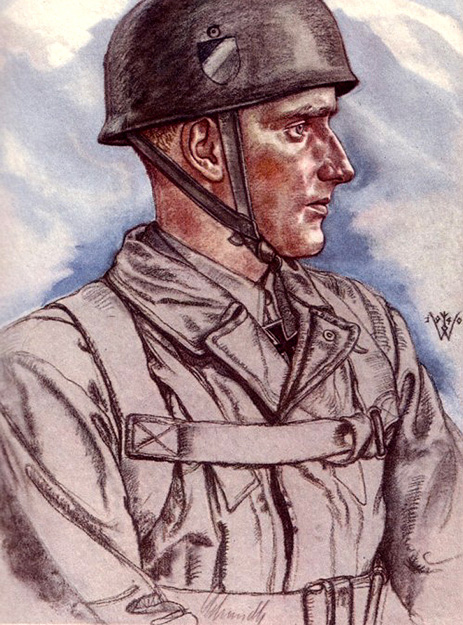
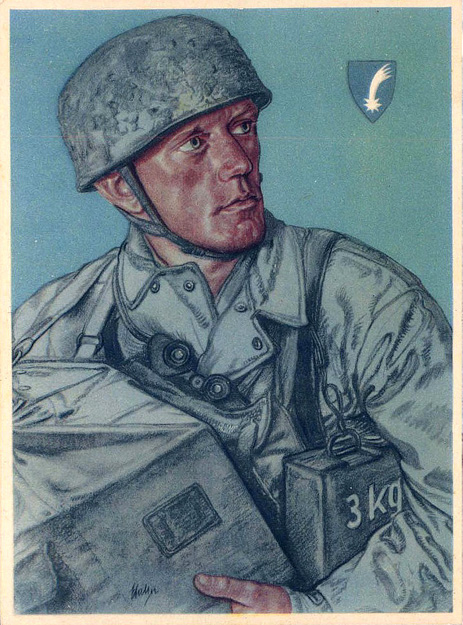
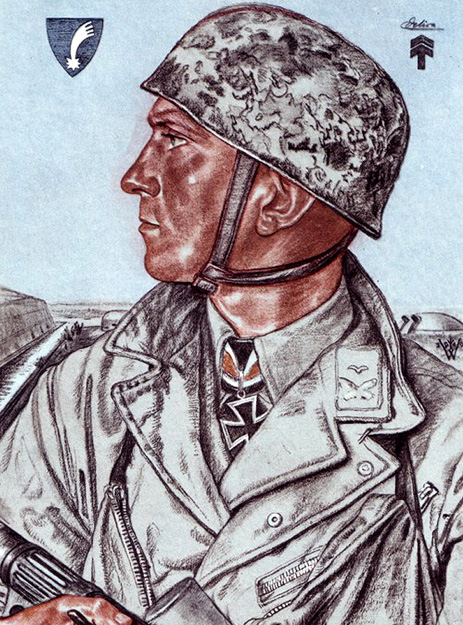
[Above: All three are done by the magnificent National Socialist artist Wolfgang Willrich. Click to enlarge.]